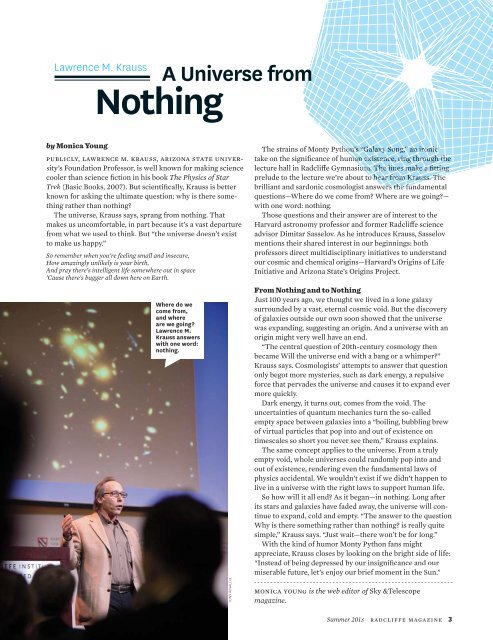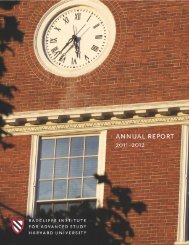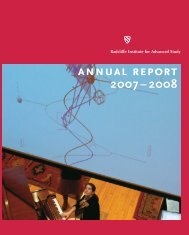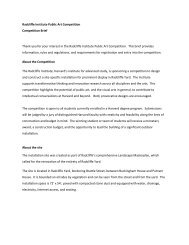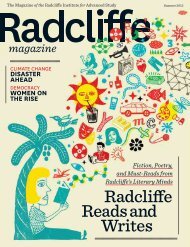Download - Radcliffe Institute for Advanced Study - Harvard University
Download - Radcliffe Institute for Advanced Study - Harvard University
Download - Radcliffe Institute for Advanced Study - Harvard University
Create successful ePaper yourself
Turn your PDF publications into a flip-book with our unique Google optimized e-Paper software.
Lawrence M. Krauss<br />
A Universe from<br />
Nothing<br />
by Monica Young<br />
Publicly, Lawrence M. Krauss, Arizona State <strong>University</strong>’s<br />
Foundation Professor, is well known <strong>for</strong> making science<br />
cooler than science fiction in his book The Physics of Star<br />
Trek (Basic Books, 2007). But scientifically, Krauss is better<br />
known <strong>for</strong> asking the ultimate question: why is there something<br />
rather than nothing<br />
The universe, Krauss says, sprang from nothing. That<br />
makes us uncom<strong>for</strong>table, in part because it’s a vast departure<br />
from what we used to think. But “the universe doesn’t exist<br />
to make us happy.”<br />
So remember when you’re feeling small and insecure,<br />
How amazingly unlikely is your birth,<br />
And pray there’s intelligent life somewhere out in space<br />
’Cause there’s bugger all down here on Earth.<br />
Where do we<br />
come from,<br />
and where<br />
are we going<br />
Lawrence M.<br />
Krauss answers<br />
with one word:<br />
nothing.<br />
TONY RINALDO<br />
The strains of Monty Python’s “Galaxy Song,” an ironic<br />
take on the significance of human existence, ring through the<br />
lecture hall in <strong>Radcliffe</strong> Gymnasium. The lines make a fitting<br />
prelude to the lecture we’re about to hear from Krauss. The<br />
brilliant and sardonic cosmologist answers the fundamental<br />
questions—Where do we come from Where are we going—<br />
with one word: nothing.<br />
Those questions and their answer are of interest to the<br />
<strong>Harvard</strong> astronomy professor and <strong>for</strong>mer <strong>Radcliffe</strong> science<br />
advisor Dimitar Sasselov. As he introduces Krauss, Sasselov<br />
mentions their shared interest in our beginnings: both<br />
professors direct multidisciplinary initiatives to understand<br />
our cosmic and chemical origins—<strong>Harvard</strong>’s Origins of Life<br />
Initiative and Arizona State’s Origins Project.<br />
From Nothing and to Nothing<br />
Just 100 years ago, we thought we lived in a lone galaxy<br />
surrounded by a vast, eternal cosmic void. But the discovery<br />
of galaxies outside our own soon showed that the universe<br />
was expanding, suggesting an origin. And a universe with an<br />
origin might very well have an end.<br />
“The central question of 20th-century cosmology then<br />
became Will the universe end with a bang or a whimper”<br />
Krauss says. Cosmologists’ attempts to answer that question<br />
only begot more mysteries, such as dark energy, a repulsive<br />
<strong>for</strong>ce that pervades the universe and causes it to expand ever<br />
more quickly.<br />
Dark energy, it turns out, comes from the void. The<br />
uncertainties of quantum mechanics turn the so-called<br />
empty space between galaxies into a “boiling, bubbling brew<br />
of virtual particles that pop into and out of existence on<br />
timescales so short you never see them,” Krauss explains.<br />
The same concept applies to the universe. From a truly<br />
empty void, whole universes could randomly pop into and<br />
out of existence, rendering even the fundamental laws of<br />
physics accidental. We wouldn’t exist if we didn’t happen to<br />
live in a universe with the right laws to support human life.<br />
So how will it all end As it began—in nothing. Long after<br />
its stars and galaxies have faded away, the universe will continue<br />
to expand, cold and empty. “The answer to the question<br />
Why is there something rather than nothing is really quite<br />
simple,” Krauss says. “Just wait—there won’t be <strong>for</strong> long.”<br />
With the kind of humor Monty Python fans might<br />
appreciate, Krauss closes by looking on the bright side of life:<br />
“Instead of being depressed by our insignificance and our<br />
miserable future, let’s enjoy our brief moment in the Sun.”<br />
Monica Young is the web editor of Sky &Telescope<br />
magazine.<br />
Summer 2013 radcliffe magazine 3


